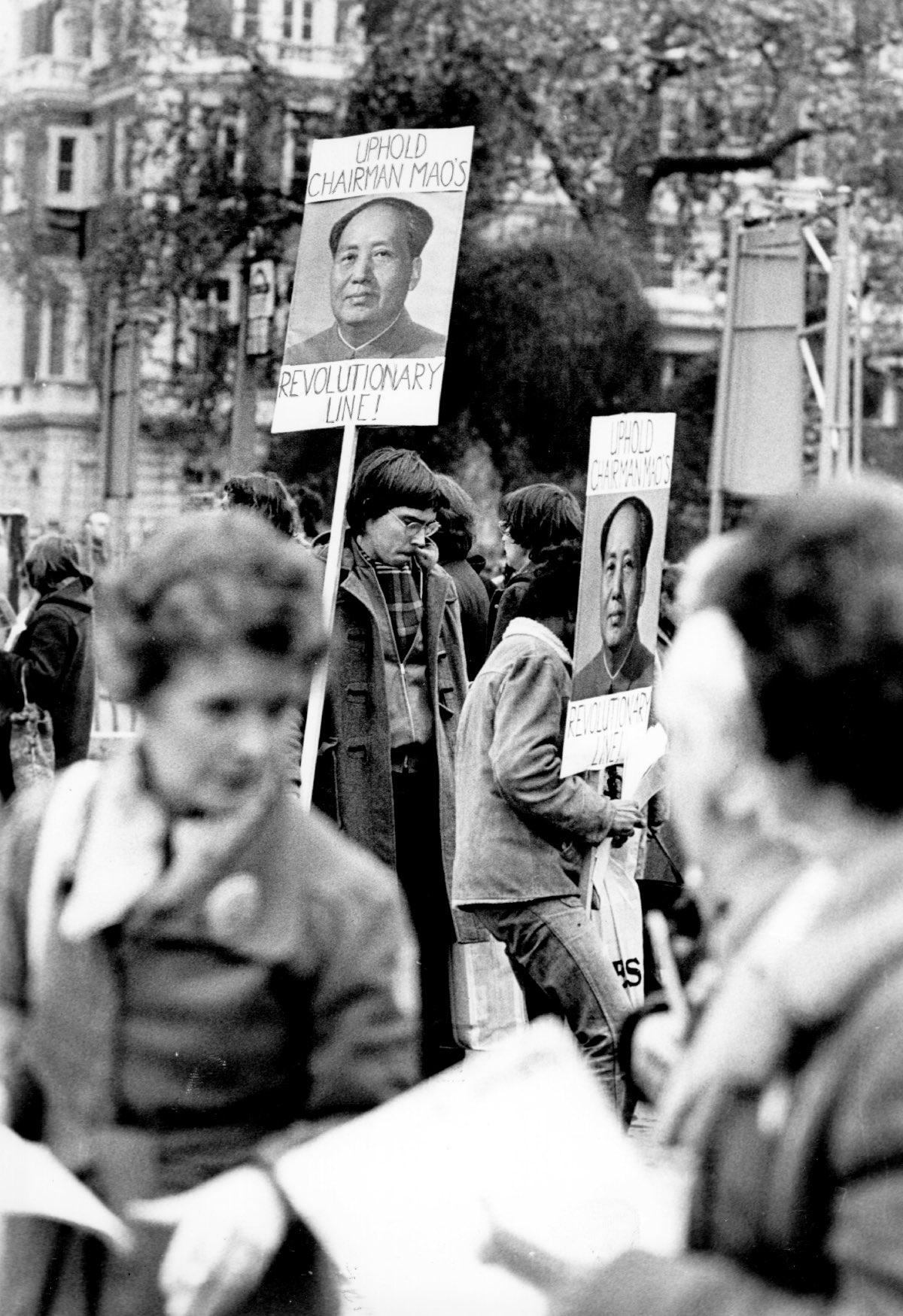
By the mid-1970’s the architecture of the UK anti-revisionist movement was more or less established with two major national organizations and a host of smaller groups, considered large if they had a stable membership of a dozen – continuing to exist.

For the first half of the decade, it was the CPB (ML) led by Reg Birch that seemed the most promising organisation to make a political break through. Nationally organised, led by a leading trade union leader, and having a workplace base in the engineering union, it suffered from being guided by a chauvinistic political line that made it impotent in terms of going beyond the dominant Labourist ideology of trade unionism. At the Party’s Second Congress in 1971, the defining theoretical feature of the organisation was expressed in “The British Working Class and its Party” which argued that were only two classes in Britain. As an organisation, the CPB (ML) never produced a theoretical journal but continued to issue a ’written by workers’ paper, The Worker, on a monthly basis.
Its principal rival for the designation of “leading centre” of UK anti-revisionism was the Communist Federation of Britain (Marxist-Leninist) whose credentials were enhanced when it threw off its federal party building approach at its Third Conference in March 1976. The CFB’s standing was enhanced with its rebirth as the Revolutionary Communist League of Britain in July 1977. This was the result of fusion with the Communist Unity Association and a potential new partnership with the Communist Workers Movement. The CWM was formed in 1976 by three branches that had left the CPB (ML).
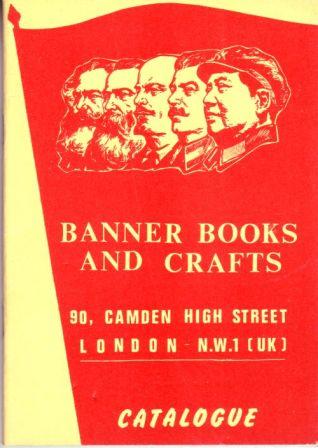
The later 1970’s saw a slow numerical decline in active Maoists in Britain: the rapid growth and turnover of the late 1960’s was now but a distant memory. The movement was wracked by a number of strategic political disputes in the late 1970s that fundamentally re-shaped it. As small groups disintegrated, former members would seek out one or another political home: leading comrades of the East London Marxist-Leninist Association (that had evolved partly out of the North London Alliance in Defence of Workers Rights) first went into the CPB (ML) and six months later into the RCLB.
Other groups, like the Communist Organization of the British Isles, formed in 1974, devoted itself to theoretical questions. The Manchester Marxist-Leninist Group worked with other groups to form the Joint Action Committee of Marxist-Leninists in 1975, largely to do solidarity work with foreign revolutionary movements (notably in Eriteria and Kampuchea). Some groups like the Association of Communist Workers and the Communist Unity Association (M-L) chiefly distinguished themselves by the prolific production of critiques of other organisations’ political positions in duplicated pamphlets.
Some organisations became mere shadows of their previous selves and gradually disappeared: the Communist Workers League of Britain declined after a series of expulsions of members but did produce two studies on workplace organisation in 1974 and the need to build the party in their 1976 publication, ’Hey! It’s Up to Us’ that proposed a Party-building Commission of all Marxist-Leninists to which only one other organisation responded favourably.
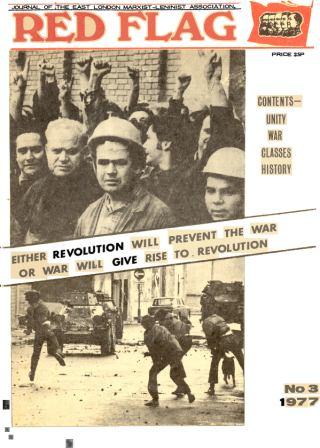
The Communist Party of England (Marxist-Leninist) (CPE (ML)) may have considered itself “the party” but it was a minority within the movement and suffered a substantial loss of momentum when a split in 1974 saw the formation of the Workers Institute of Marxism-Leninism-Mao Tse-Tung Thought.
Differences on international theory and strategy in the late 1970s, including the “Three Worlds Theory” and the Albanian criticism of China and Mao Zedong exacerbated the crisis of UK Maoism. This period saw a rapid defection by the Communist Party of Britain (Marxist-Leninist), first to a pro-Albanian stance and then as quickly to defence of the Soviet Union in the 1980’s. This pro-Albanian turn by was echoed by the Communist Party of England (Marxist-Leninist) as it joined in the condemnation of the “anti-Marxist” Mao in support of the Albanian positions. This left the Revolutionary Communist League of Britain as the only significant group still supporting the post-Mao leadership in China, which was reaffirmed by a RCLB delegation to China in November 1977.
The Family Tree of the Anti-Revisionist Movement in the UK [Chart]
The High Tide of UK Anti-Revisionism: A History by Sam Richards
Remembering the Maoist Movement in Britain by Neil Redfern
’Imperialism runs deep’: Interview with Robert Biel on British Maoism and its afterlives
The Humberside Worker,n.d., by the Hull Marxist-Leninist Group
Press Releases, Invitation Letter, etc.
Czechoslovakia, 1968. Tanks for the Memory, Leonid [leaflet]
What can Marxist-Leninist-Maoists learn from the Anti-Revisionist “New Communist Movement” in Britain?, Shobhiku Vazhi
The CWM was formed in 1976 when three branches split away from the CPB (ML) based on a criticism of what it characterized as the organisation’s opportunism and reactionary politics: “The Absolute decline of the Communist Party of Britain (Marxist-Leninist)”. The document later became the basis for a call for a national conference of Marxist-Leninists in July 1977 but it overestimated the possibility of uniting the various potential attending groups against the background of the Albanian break with China and its impact on the Marxist-Leninist movement.
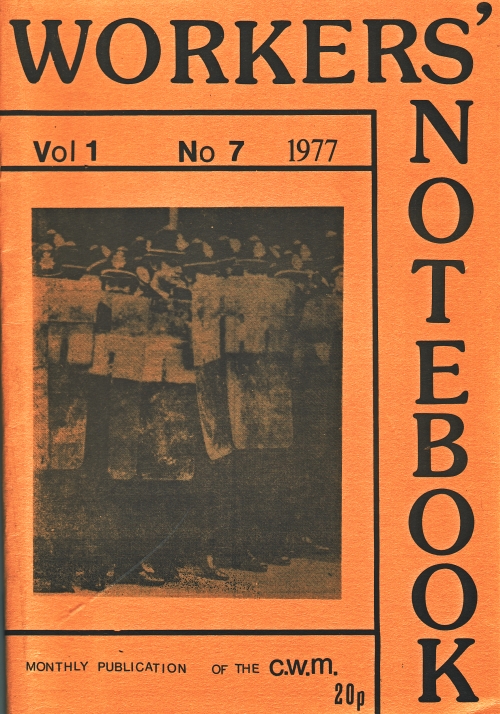
In reaction to what it perceived as the stifling internal life of the CPB (ML), the CWM was characterised by a loose internal life and undirected activism. The organisation did recruit from other groups, including some members of the Joint Action Committee of Marxist-Leninists, but this probably only added to the factionalism that plagued the CWM (the Birmingham branch, for example, split from the organization).
The CWM made efforts to consolidate itself; publications were produced, Workers’ Notebook and the New Age newspaper; conferences were held and political support for ‘the three Worlds Theory’ was adopted as policy. But the drive to implement a democratic centralist internal life caused disagreement and members’ defections increased, including Ian Williams, who joined the Labour Party. In the end, the CWM with its reduced membership, joined the RCLB in June 1980.
The Historical Experience of the C.W.M. (Draft)
Take the Bolshevik, Not the Menshevik, Road in Party Building [on the CWM Conference]
On the Birmingham Conference, July (1977) by the Workers’ Party of Scotland (Marxist-Leninist)
The “Absolute Decline” of the Communist Party of Britain (Marxist-Leninist)
Open Letter to All Marxist-Leninist Organizations
Programme of the Communist Workers’ Movement [1977]
Conference of Marxist-Leninists, Birmingham, 2/3 July 1977 by Ian Williams
Proposal for a Conference on Marxist-Leninist Unity by the Communist Workers’ Movement
Theses for the Proposed Conference on Marxist-Leninist Unity by the Communist Federation of Britain (M-L)
Proposed Amendments to the CFB (M-L)'s Theses for the Proposed Conference on Marxist-Leninist Unity by the Coventry Workers Association
Some Points Concerning Marxist-Leninist Unity by J.G., Communist Workers’ Movement
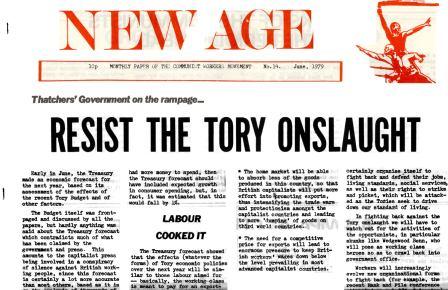
On "The Way Forward" by M.D. (London), Joint Action Committee of Marxist-Leninists
The Present Situation – Our Tasks by the Joint Action Committee of Marxist-Leninists
Draft Notes for Conference on the Crisis by the Communist Workers’ Movement
The Trade Union Movement by the Communist Workers’ Movement
Paper on "The International Situation" by a comrade in Birmingham, Joint Action Committee of Marxist-Leninists
Notes Toward a Class Analysis by the Communist Workers’ Movement [?]
Submission on the National Question in the British Isles by the Communist Workers’ Movement
Letter to the Conference from most members of the Joint Action Committee of Marxist-Leninists
Letter to the Conference from individuals who have been associated with the Joint Action Committee of Marxist-Leninists
After the Conference – Toward Unity by the Communist Workers’ Movement
* * *
Why Paul Foot Should Be A Socialist. The case against the Socialist Workers’ Party
CWM National Conference: A Success
Birch Sinks Lower [New Age No. 3, April/May 1978]
CWM and RCLB: Determined to Unite [New Age No. 4, June 1978]
The State of the Unions [New Age No. 5, July 1978]
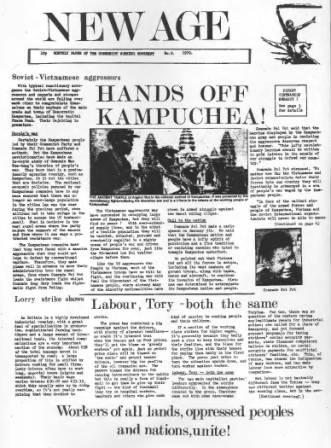
Whose Coup? [on Afghanistan] [New Age No. 5, July 1978]
Kampuchea: Fear and Fantasy by Malcolm Caldwell [New Age No. 5, July 1978]
Eritrea–Fighting for Freedom [New Age No. 8, November 1978]
WRP Against revolutionary violence
NC Minutes: 4th November 1978. Item #4: Yugoslavia [Internal Bulletin #5]
Obituary: Malcolm Caldwell [New Age No. 9, February 1979]
Hands Off Kampuchea! [New Age No. 9, February 1979]
The VOP case: Revolutionary journal attacked for defending the working class
Iran–The People Stand Up [New Age No. 10, March 1979]
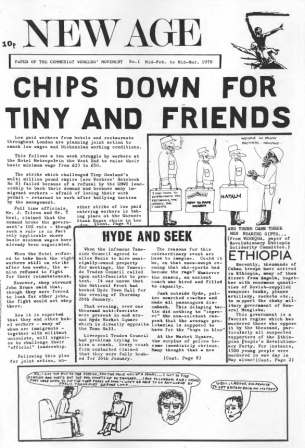
Three Nations One Enemy [New Age No. 11, April 1979]
Anti-Racist Tactics in Hackney: Time for a Rethink [New Age No. 12, May 1979]
Ireland: A visit to the north OR MORE CORRECTLY THE OCCUPIED SIX COUNTIES
Rebuild the Revolutionary Spirit
Revolutionary anti-imperialist struggle in Ireland: Build Solidarity!
The East is Red [New Age No. 16, October 1979]
Marx, Engels and the Fenians [New Age No. 16, October 1979]
Ban the Birch [New Age No. 17, November 1979]
Communist Workers’ Movement holds 3rd National Conference
Interview with National Secretary of the CWM
Political Programme of the Communist Workers’ Movement [1980]
[Back to top]
The RCLB was created in July 1977 as the result of the fusion of the Communist Federation of Britain (Marxist-Leninist) and the Communist Unity Association. It continued to grow thereafter through its merger with the Communist Workers’ Movement in June 1980, and its subsequent fusion with one of the largest of the remaining small groups, the Birmingham Communist Association.
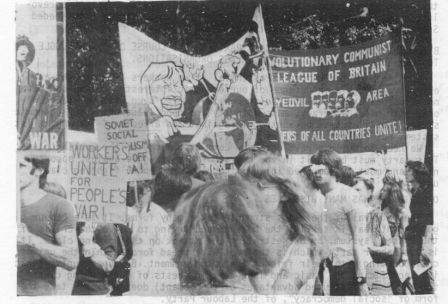
Shortly after its foundation, the RCLB witnessed in quick succession the abandonment or expulsion of a number of leading comrades. The RCLB’s Secretary (associated with the “Anti-League Faction”) was expelled and went on to form the Stockport Communist Group in 1980. London was the site of a second major struggle against the alleged “rightist” politics and “bureaucratic authoritarianism” of the League Chairman; and the departure of the editor of Class Struggle, the RCLB’s monthly newspaper, brought about by the activities of a self declared “Kim Il Sung” faction that worked under the auspices of Mosquito Press.

During the 1980s, the RCLB maintained its solidarity work with “unconditional support” for the struggle in Ireland, activity in anti-deportation and anti-fascist work supporting Anti-Fascist Action and in the Miners’ Strike of 1985. There was also a strong internationalist stance in its solidarity work on Palestine, the Philippines, Cambodia and Southern Africa. As part of this effort, in 1986 the RCLB organised a “Eurocentrism & the Communist Movement” conference in London. A publication of the same name was produced and received an international readership out of proportion to the membership of what was a declining organisation.
Muted criticism of the course taken by the Communist Party of China emerged in the RCLB’s opposition to the violent suppression of the Tianamen Square protests in 1989. The organisation adopted a new Political Platform in 1992 but did little to re-energise itself. The bookshop face and organising hub of the organization – New Era Books – was closed in January 1993. There were less than 30 participants at the RCLB’s last national meeting in Hoxton, London in 1996 but the organisation was unceremoniously dissolved in April 1998.
Revisionism: The Politics of the CPGB Past & Present
CUA-CFB Unite in Revolutionary Communist League
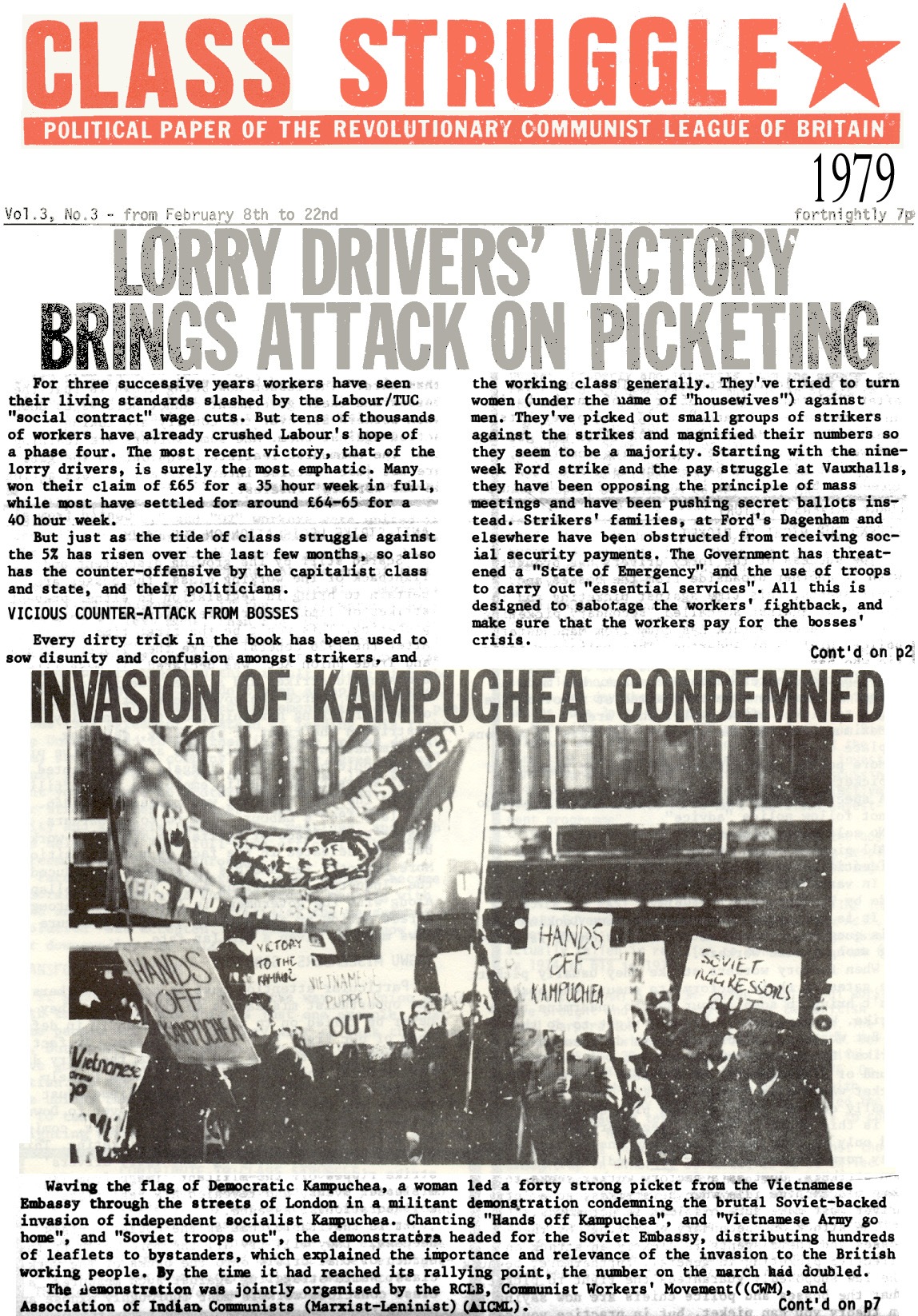
Militant Founding Congress of Revolutionary Communist League of Britain Held
Secretary of the Central Committee of the RCLB interviewed
Revolutionary Communist League Founded [Peking Review]
Manifesto of the Revolutionary Communist League of Britain
Demonstrators Denounce Soviet Aggression
Forge Ahead In Building the League! (Political Report to the general meeting of the London Branch) [unpublished internal document]
Take the Bolshevik, Not the Menshevik, Road in Party Building
Victory over the “gang of four”
Support for Socialist China Means Wholehearted Support for China’s Veteran Leaders
“Fight on to Unite the Marxist-Leninist Movement”
Proletarian Internationalism and the Duties of British Communists
Struggle to Build a Fine Style of Work in the League!
Forge Ahead In Building the League! (Political Report to the general meeting of the London Branch Committee) [unpublished internal document]

Grasp Bolshevization – Forge Ahead In Building the League (Political Report of the London Branch Committee) [unpublished internal document]
There Is A Two Line Struggle in London District by J.B. [unpublished internal document]
Turn the Unions into Fighting Class Organisations
Ten Years after Czechoslovakia – Strengthen the Struggle against Soviet Hegemonism!
British Communists Lead Demonstration
Firmly Establish the Factory Cells!
A Major Step in Building the Single Leading Centre
Fight for Democratic Rights for National Minorities. Build Unity of the Working Class
Refute the Right Opportunist Line in Party Building
Britain and the Struggle against Superpower Hegemonism and War
National Minorities – State Racism Hides Behind National Front
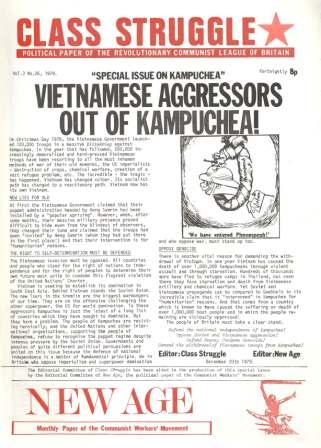
Kampuchea Resists Massive Viet Nam Invasion/Dr. Caldwell Murdered
Soviet-Vietnam Aggression Denounced Throughout the World
China and Vietnam: What Is The Truth? [leaflet]
Invasion of Kampuchea Condemned
K.R.A. Launches Fierce Counter-Attack
’The Kampuchean People Will Defeat the Agressors’
Kampuchea: Part of a Common Struggle Against Soviet Expansion
Class Struggle “Special Issue on Kampuchea“
Kampuchea Support Campaign Established
London meeting... Kampuchea Solidarity develops
Miscellaneous articles on Kampuchea from Class Struggle, 1982-1988
* * *
Notes on the So-called Anti-League Faction
The Bourgeoisie Has Seized Power in the Political Committee!
The Two-Line Struggle in the RCLB is a Struggle Between Marxism and Revisionism
Deeply Criticise the Splittist and Idealist Document of the Anti-League Faction
Militant RCL Conference Denounces Faction
The Anti-League Faction: Its History and Main Features
* * *
Labour, Tory – Two Wings of a single bird of prey
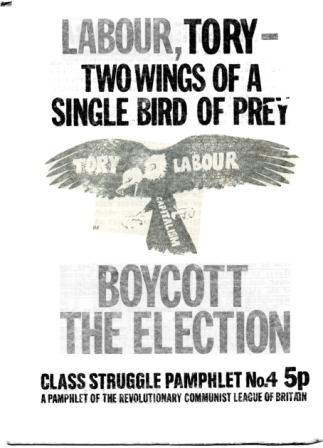
The Party of Labour of Albania – A New Centre of Revisionism
Build the Party at the Point of Production
Central Committee Working Resolution on Ireland [internal document]
Some Points of Self-Criticism on Ireland by T. E.
China’s New Long March: A continuation of Mao’s revolutionary line
District Committee Report to the General Meeting of the London District [internal document]
Draft Internal Statement on the History of the RCL by T.E.
Conference Arrangements and Two Proposed Resolutions
Standing Committee Revised Draft of Internal Statement on the History of the RCL
Amendments to the Draft Internal Statement on the History of the RCL
Further Amendments to the Statement on the History of the RCL
* * *
Zimbabwe 1980 – The Year of People’s Power [flyer]
Comments on the Political Line of the Zimbabwe Campaign of 1978 by T.E.
Study Notes to Marx’s Wage Labour and Capital
Birmingham meeting celebrates BCA merger
Wales Letter: Class and National Struggles
Our Coverage of Ireland by the editor of Class Struggle
Connollyism and Leninism by Hugh Stevens
The Irish Struggle, the CFB and the RCL by J. B.
Ireland: Firm Support for the Republican Movement
Report on the Second Congress of the Revolutionary Communist League of Britain
Report to the Second Congress by the Chairman of the First CC
Introduction to the Second Congress’s Revised Text of Section 7 of the Programmatic Document
Programmatic Document Section VII (as amended by the 2nd Congress)
Foreign Communists Greet RCLB Second Congress
What is the Theory of Three Worlds? by the London District Committee [internal document]
The Bradford 12 by the RCLB [Anti-Racist Anti-Fascist Bulletin]
An Analysis of the Landmark Bradford 12 Trial

Bradford 12 Defence Campaign Growing
Free the Bradford 12! Trial Starts April 26
Self Defence is No Offense [Class Struggle June 1982]
Self Defence is no offence! How the Bradford 12 won their freedom
A Victory for Black People [Class Struggle August 1982]
Bradford 12 and Ireland [Class Struggle August 1982]
* * *
The Struggle of National Minority People and the line of the RCL [October, Volume 1, No. 1, April 1982]
Welsh Nationalists under attack
Reorientate the League for the Tasks of the Moment!
Criticise and Overturn the League’s Programmatic Work
Reorientate the League for the Tasks of the Moment! – A Criticism
In Response to Reorientate the League by a comrade from the Leeds branch
RTL – Redraft of the First Seven Paragraphs
Rally Around “Reorientate The League!”
Amendment to “Reorientate The League....”
Proposed Offering of Amendments for Conference
* * *
The Oppression of Women – Criticism of Old Lines
Racism, National oppression and Free National development [October, Volume 1, No. 2, October 1982]
Building An Ireland Solidarity Movement
Irish Independence and Britain’s Communists by H. Stephens
A Task Taken Up For Solution by Keith Anderson
Spirit of Freedom: RCL Statement on Ireland
Letter on KA’s Resignation from the League [internal document]
Anti-Racist Anti-Fascist Bulletin [January 1984]
Eurocentrism, the ’key link’ in theoretical work
Black National Minorities, Working Class and the R.C.G. [October, Volume 1, No. 3, Summer 1985]
Editorial [on the role of a political paper]
Eurocentrism and Revolutionary Politics [Ad for Conference]
Eurocentrism and the Communist Movement
Eurocentrism and the Communist Movement [Internal study papers (uncirculated)]
October, Eurocentrism and the Theoretical Development of the RCL [internal document]
Challenging Eurocentrism by Juliet Ucelli and Dennis O’Neil [Foward Motion,]
The Theory and Practice of Mao
Ireland: Class Struggle and National Liberation
Ireland’s Neutrality and Irish Republicanism
Workers Revolutionary Party 1985: The Death of A Political Cult
Glimpses into Herstory: Women’s Oppression
Criticism of the ’Revolutionary Internationalist Movement’
Statement of the Central Committee of the R.C.L.B. [on the Tiananmen Square massacre]
China A Class Struggle Special Supplement [on the Tiananmen Square massacre]
Poland: Socialism or Social Democracy

St. Pancras 1960: When Tenants Came Out in Their Thousands
Wapping, Jan 24 – An Eyewitness Account
Letter: The Two Superpowers and the Arms Race
Editorial: Solidarity Takes Power
The responsibility of membership of the RCL
Class Struggle, National Struggle and Party Building
Discussion Document on Methods of Work
The Working Class and the Struggle for Socialism
The Political Economy of Imperialism and its Effect On Class Structure
* * *
RCL Congress: Women top of the agenda...
Conference on the Political Economy of Imperialism: Documents and Notes [June 23, 1990]
Should Women Fight Imperialism?
RCL Conference: “The Future of Socialism”
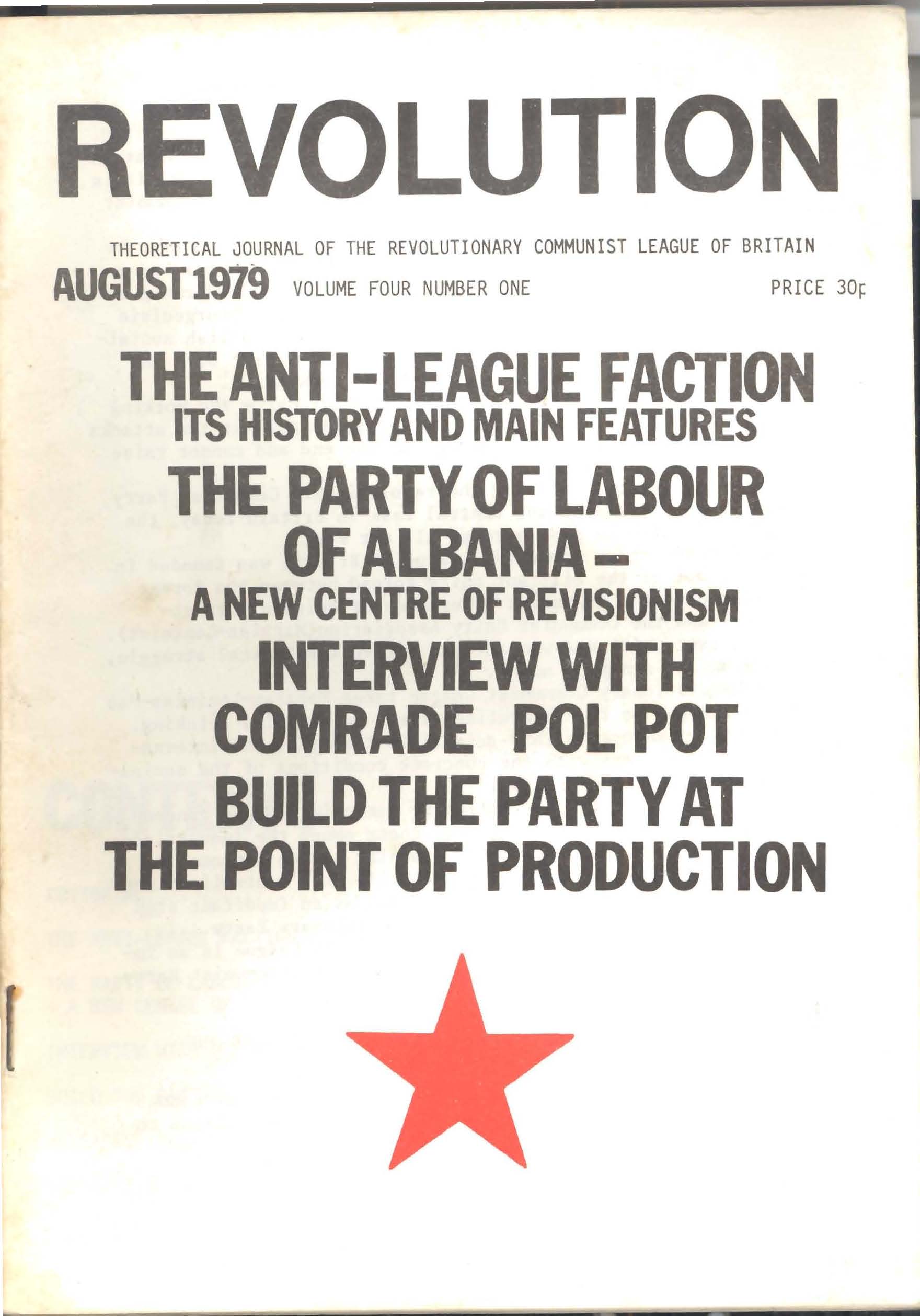
Hands Off Poland [flyer]
Poland: Military Rule Exposes Sham ’Socialism’
Speech Introducing the Political Platform of the RCL
The Political Platform of the RCL
Why Publish the Political platform of the RCL?
“Was it Worth 25 Years?” Some Ask. But the Struggle is Not Over. [leaflet on Ireland]
Travelling Out of Limbo [on the demise of the Class War Federation]
RCL International Digest, August 1993
RCL International Digest, November 1993
[Back to top]

The NCG began as the Nottingham branch of the CPB (ML), which broke away in 1975. Led by ’Harry Powell’, the NCG soon articulated two clear points of demarcation from other UK ML groups: its emphasis on programmatic work and its strong identification with and support for the Gang of Four and the US–based Revolutionary Communist Party. In 1980 the NCG embarked upon the task of setting up a party building commission with the equally small Stockport Communist Group, comprising two defectors from the RCLB. The resulting appeal, “Build the Party!” was issued in 1981 “to develop a revolutionary programme embodying a thorough scientific analysis of the character of contemporary British capitalism and on the basis of this scientific knowledge to elaborate a strategy for the conduct of revolutionary struggle in Britain.” However, the five person commission created to further the project broke up under “intense ideological and political struggles.”
Stockport Communist Group: A Self-criticism
Revolution – The Only Way Forward! Manifesto of the Nottingham Communist Group
Quotations from Mao by the Nottingham Communist Group
The Threat of Fascism by the Nottingham Communist Group
The Real Choice We Face by the Nottingham Communist Group
Controversy over China by the Nottingham Communist Group
Mao on Revisionism by the Nottingham Communist Group
Work – Four Letter Word? by the Nottingham Communist Group
Is China Still Socialist? by the Nottingham Communist Group
Resolution: The Present International Situation and the Tasks of the Proletariat. The Contribution of the British Proletariat to the World Proletarian Revolution by Communist Unity (Stockport Communist Group)
The Way Forward in Re-building the Communist Party by the Stockport Communist Group [1979]
The MARXIST-LENINIST MOVEMENT IN BRITAIN: Past, Present and Future by the Nottingham Communist Group
Revolution on Trial! [leaflet on Gang of Four trial] by the Nottingham Communist Group
Resolution on the Joint Communique by the Stockport Communist Group [from A World To Win, May 1982]
Build the Party! by the Nottingham Communist Group
[Back to top]
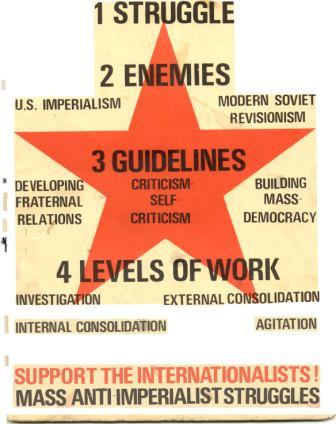
Although formed in March 1972, the CPE (ML) had its roots in an earlier incarnation, the English Communist Movement (Marxist-Leninist) that emerged from the student-dominated Internationalist trend which originated in Canada with Hardial Bains. The politics of the organisation – in all its forms – was dominated by a stress on ideological struggle, and the voluntarism that characterised the ‘Necessity for Change’ Conference held in London in August 1967. For these militants, ceaseless activism was deemed proof of one’s revolutionary consciousness.
The activities of the CPE (ML) were labelled as “ultra-leftist” by many others in the ML movement. There were also internal struggles, including expulsions in 1974 that saw the formation of the Workers’ Institute of Marxism-Leninism-Mao Tsetung Thought. However, the real shake-up to the organisation came with the discovery that they had made “the serious, though understandable, mistake of adopting ‘Mao Zedong Thought’ alongside Marxism-Leninism as their guiding ideology.” The solution lay in founding of a “genuine party of the British Proletariat:” the very pro-Albanian RCPB (ML) in March 1979.

The creation of the RCPB (ML) marked the rejection of the organisation’s Maoist allegiances, a cover-up of its Maoist past, and the recognition of the Party of Labour of Albania, headed by Enver Hoxha as “the foremost Party in the International Marxist-Leninist Communist Movement”.
The RCPB (ML) suffered the loss of two leading comrades within a short time after its foundation. In December 1981, founding member and noted avant-garde composer, Cornelius Cardew was killed in a car accident and John Buckle, who had led the party under the name of “David Williams” since 1978, died in an air crash on November 27, 1983.
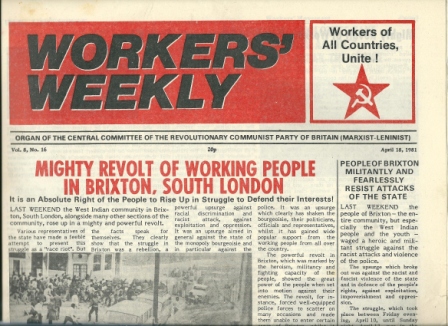
The new party continued the traditions of its predecessors – frenetic activity and the proliferation of non-sustainable broad front organisations that consisted of very few members. The RCPB (ML) produced publications for the various broad fronts that it created in the early 1980s – the ’Trade Union Revolutionary Opposition’ (something the CPB (ML) refused to countenance), the Women’s Union of Britain and People’s Democratic Front.
Today, the RCPB (ML) has abandoned much of its anti-revisionist past. In the spirit of “one big Marxist tent” it is likely to be sharing platforms with the New Communist Party and the Communist Party of Britain at solidarity meetings in praise of North Korea.
In 2011, the RCPB (M-L) began publication of a new irregular monthly magazine, The Line of March.
A Maoist Organization in 1970s Britain by Rod Allison
Words [Published by the Irish Internationalists, 1967]
One Struggle, Two Enemies, Three Guidelines, Four Levels of Work
Necessity for Change! by Hardial Bains
Sussex ’internationalists’ attack SACU’s ’friendship lobby’... and two leading members reply [on the Society for Anglo-Chinese Understanding]
British Working People Enthusiastically Study, Propagate Mao TseTung Thought
Communist Party of England (M-L), Counter-revolutionary group
In Commemoration of Comrade Hardial Bains
Long Live the Memory of Our Comrade John Buckle
Spying on the Communist Party of England (M-L)
Death of a Dissident [On Cornelius Cardew] by Edward Fox
Cornelius Cardew 70th Birthday Anniversary Festival [articles and photographs]
Liberation Music [on Cornelius Cardew] by Richard Gott
Cornelius Cardew – Outstanding Musician, Composer, Communist by Sandra L. Smith [also link to film on Cornelius Cardew, "The Content of Our Song" by independent film-maker Stuart Monro]
Starting from Scratch: Cornelius Cardew and the Orchestra as Insurgency by Robert Barry
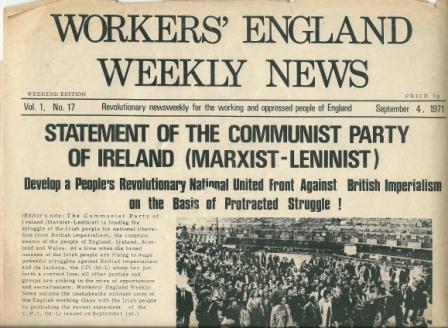
Criticism of the CPE (M-L) With Regard to the Movement for Zimbabwe Solidarity by Harpal Brar
Why Does the RCP of Britain (ML) Reject the Slogan ’The Main Enemy Is at Home’? by the Marxist-Leninist Party of the USA
Introducing the Correspondence Between the MLP,USA and the RCP of Britain (ML)
On the history of the nationalist deviations of the RCP of Britain (ML) by the Marxist-Leninist Party of the USA
The nationalist program of the RCP of Britain (ML) violates the ABC’s of Marxism-Leninism by the Marxist-Leninist Party of the USA
On the 20th anniversary of the Internationalists: The Myth of the Glorious Past–CPC(M-L)’s Pretext for International Factionalism by the Marxist-Leninist Party of the U.S.A.
On the question of communist unity. Reply to comrades who wonder why RCPB(ML) and CPGB-ML are separate organisations. by the Communist Party of Great Britain (Marxist-Leninist)
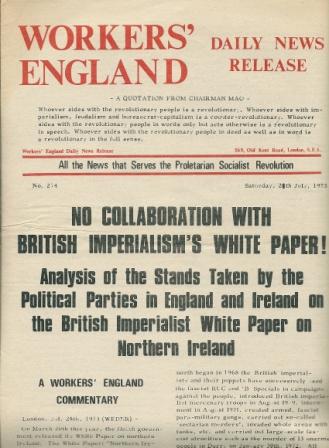
Hailing the First Anniversay of the Indian People's Liberation Army
Party School on Immigrant Workers
Hail the Great New Upsurge of the English Proletariat
Long Live the Fighting Traditions of the English Working Class
Manchester By-Election Results: A New Trend In British Politics
No Collaboration with British Imperialism's White Paper!
Who is the Real Cause of “Violence” and “Terror” in England and Ireland?
Stockhausen Serves Imperialism by Cornelius Cardew
Denounce the Police Murder of Anti-Fascist Fighter Kevin Gately
Statement of the National Executive of the Communist Party of Ireland (Marxist-Leninist) [Kevin Gately]
Statements of the National Executive Committee, CPE (ML) [on Ara Balakrishnan]
Historic Landmark in the Building of the Party of the Proletariat
British Workers Further Escalate Struggle Against Wage Restraint
Interview with Delegation of the Revolutionary Communist Party of Britain (Marxist-Leninist)
Presenting the Ideas of the First Congress of the Communist Party of England (Marxist-Leninist)
Continuing Struggle Against Nazism and Fascization of the State
Documents of the Founding Conference of the Women’s Union of Britain, March 6, 1982
No to U.S. Intervention in El Salvador!
British Maoists’ Promotion of Soviet Social Imperialism
Report of the Central Committee of RCPB (ML) Submitted to the First Congress by David Williams
The First Congress of the Revolutionary Communist Party of Britain (Marxist-Leninist) from Albania Today
Cornelius Cardew His Life and Work
RCPB (M-L) Condemns Salman Rushdie. On their knees before fundamentalism [from the Workers’ Advocate Supplement, published by the Marxist-Leninist Party, USA]
Rightists continue to condemn Rushdie. RCPB (ML) wants to outlaw blasphemy [from the Workers’ Advocate Supplement, published by the Marxist-Leninist Party, USA]
Report to the Second Congress of the Revolutionary Communist Party of Britain (Marxist-Leninist) by Michael Hamilton
The Working Class Movement and the New World Situation by Chris Coleman
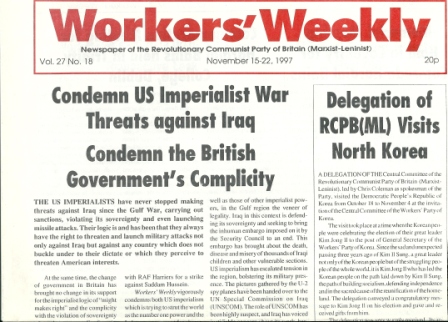
There Can Never be Genuine Democracy in Britain without Withdrawal from Ireland by Chris Coleman
There is a Way Out of the Crisis
Draft Programme for the Working Class
National Consultative Conference Points the Way Forward
The Line of March to a New Society [Political Report to the Party’s 3rd Congress on the Work of the Central Committee]
Resolutions of Third Congress of RCPB(ML)
Ten Years Since the Coventry International Seminar
The Revolutionaries [Interview with Chris Coleman]
Successful Seminar: “There Is A Way Out of the Crisis”
RCPB (ML) Holds Social. Setting the Course for 2015
Our Concerns on Entering the New Year
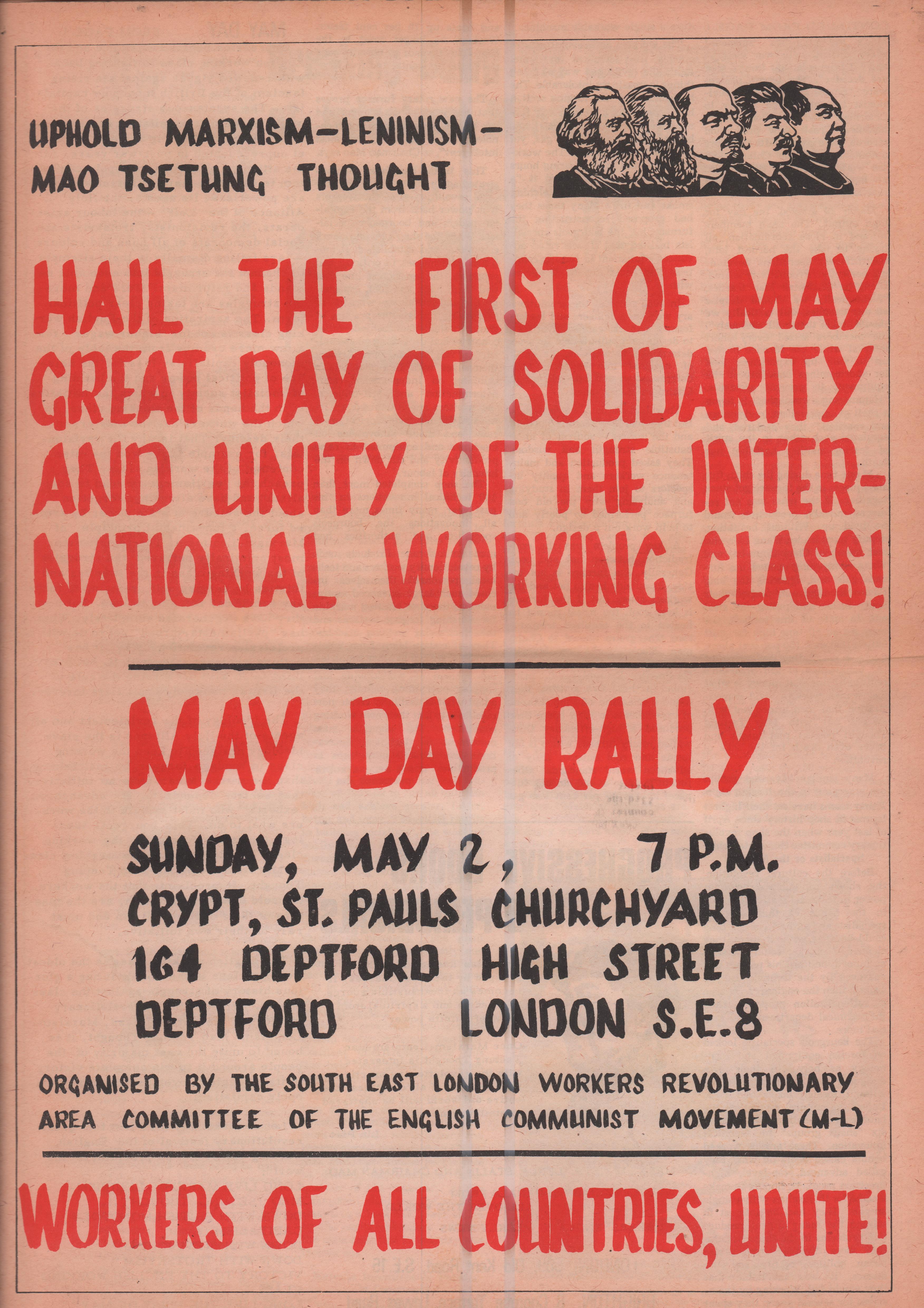
Communist England!, Vol. 1, No. 2, April 1970
Workers' England Weekly News, Vol. 1, No. 3, April 20, 1971
Workers' England Weekly News, Vol. 1, No. 4, May 1, 1971
Workers' England Weekly News, Vol. 1, No. 18, September 8, 1971
Afro-Asian Solidarity-IPSG Newsletter-East Wind, Joint Issue No. 3, December 1971-January 1972 [Death to Indian Expansionism! Long Live the Indian Revolution!]
Afro-Asian Solidarity News Release, No. 15, March 30, 1972 [Down with the Indo-Soviet Military Pact!]
Afro-Asian Solidarity News Release, No. 44, December 9, 1972 [Red Salute to the Great Indian People's Revolutionary Army!]
The Marxist-Leninist, Vol. 1, No. 1 [1974] [Internal Discussion Journal of the CPE (M-L)]
Marxist-Leninist Journal, Vol. 2, No. 2, April 1982
Marxist-Leninist Journal, Vol. 3, No. 1, February 1990
Marxist-Leninist Journal, Vol. 3, No. 2, July 1990
Marxist-Leninist Journal, Vol. 4, No. 1, January 1991
[Back to top]
The Workers’ Institute of Marxism-Leninism-Mao Tsetung Thought (substituting Mao Zedong Thought after 1979) was created in 1974 when Aravindan Balakrishnan (popularly known as Bala), formerly a member of the National Executive Committee and Central Committee of the Communist Party of England (Marxist-Leninist), led a break-away from that organization. The new organisation was characterized by the ultra-left posturing and Mao worship formerly evident in the CPE (ML) or, as Bala described them: the “Communist” Party of Elizabeth (Most-Loyal).
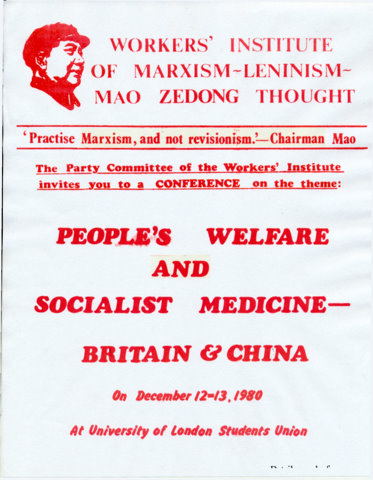
Drawing upon the Chinese experience of base areas, the Institute argued in favour of revolutionaries being based in working class communities, “the weakest link for the fascist state system” where political mobilisation involved whole families free from the “fascist rules and regulations and job security” involved in workplaces or educational institutions. Here revolutionary cadre could integrate and learn from the “sterling qualities of the labouring people while raising the intellectual level of the workers. Taking a working class job in the community is vital for this.”
Starting from this premise, the Workers’ Institute opened the Mao Tsetung Memorial Centre at 140 Acre Lane, Brixton, a poor and oppressed working-class area in South London in October 1976, running evening lectures, study groups and film showings. The Centre operated as a commune with 13 members living on the premises, half in paid work, six doing full-time revolutionary work, with a strong emphasis on women taking a leading role (apart from leading the Party Committee headed by Bala).
A distinctive feature of the Institute’s “Cultural Revolution” politics was that it regarded itself as a component of the Communist Party of China, arguing that:
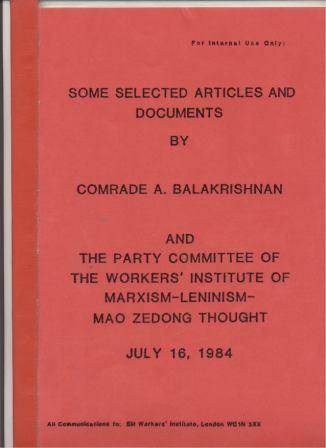
“The Communist Party of China and Chairman Mao are on the verge of launching the final offensive, this year [1975] to dismantle the old world of colonialism, imperialism and hegemonism and build the new world of socialism. The establishment of the international dictatorship of the proletariat is necessary for this, led by the Communist Party of China and Chairman Mao and with the People’s Liberation Army of China as its main pillar. Only thus can mankind march forward to communism.”
An Institute assertion that caused much amusement and embarrassment among other leftists was that the INTERNATIONAL DICTATORSHIP OF THE PROLETARIAT had indeed been established covertly in 1977 “by Our Party”, the Communist Party of China.
The Worker’s Institute came to broader public attention when the diarist in The London Times began reprinting some of the group’s material, as amusing asides. “Though the hired scribes of the bourgeoisie vainly try to “level” us by describing the Workers’ Institute as the ’most lunatic fringe of the lunatic fringe in Britain’, their masters are well aware of the danger of the rapid growth and development of the Workers’ Institute in the past four years to their class interests.”
The political activities at the Mao Memorial Centre was subject to police monitoring and a number of members were subject to deportation orders. Their refusal to recognise the authority of the courts led to further harassment and imprisonment. The closure of the Mao Memorial Centre followed a police raid on March 22, 1978. For a short period thereafter, meetings were held at the University College London Union, but by 1981 little was heard from the Workers’ Institute. If asked, the reply was that they had gone underground.
The Workers’ Institute of Marxism-Leninism-Mao Zedong Thought by Sam Richards
Press Release on the Arrest of Aravindan Balakrishnan and his Comrades, 1978
A Cruel Miscarriage of Justice by the Workers’ Institute for the Advanced Studies of Nature
Clearing Comrade Bala’s Name: Exposing the Lies of the ’Lambeth Slavery Case’
Aravindan Balakrishnan, July 16, 1940-April 8, 2022 [short version]
Aravindan Balakrishnan, July 16, 1940-April 8, 2022 [long version]
Introducing The New World, from The New World, Vol. 1, No. 1, Jan-Feb. 1975
The New World Editorial: Away With All Pests! Our Force is Irresistable! from The New World, Vol. 1, No. 2, March-August 1975
Practice Marxism, Not Revisionism; Uphold Proletarian Internationalism!, by Aravindan Balakrishnan, from The New World, Vol. 1, No. 2, March-August 1975
The Final Crisis of Imperialism and the Role of the Third World from The New World, Vol. 1, No. 2, March-August 1975
Question of Nationalities in Britain with Particular Reference to Minority Nationalities
The Education System and the Role of Student Youth and Intellectuals
Workers Struggles and Trade Unionism
Women's Emancipation and Proletarian Revolution
* * *
Eternal Glory to our Great Leader and Teacher Chairman Mao Tsetung!
Revolutionary Filmshow: Red Detachment of Women
Revolutionary Filmshow: Socialist China Builds the New World
On Building a Revolutionary Stable Base Area
Long Live the Revolutionary Tradition of Women the World Over!
On the Closure of the Mao Zedong Memorial Centre by the British Fascist State
Invitation to Conference on the Unity of the Left in Britain
Invitation to Conference on People's Welfare and Socialist Medicine – Britain and China
Shameless British Human Rights Hypocrisy!
South London Workers' Bulletin, No. 55, October 10, 1976
South London Workers' Bulletin, No. 60, November 17, 1976
South London Workers' Bulletin, June 1, 1977
[Back to top]
The roots of the organisation lay in the Revolutionary Marxist-Leninist League led by A. Manchanda. A split in the RMML in August 1969 saw about half the RMLL membership leave; some led by Harpal Brar formed the Association of Communist Workers. Others, led by former RSSF student leader Edward Davoren, founded the Irish National Liberation Solidarity Front in September 1969.
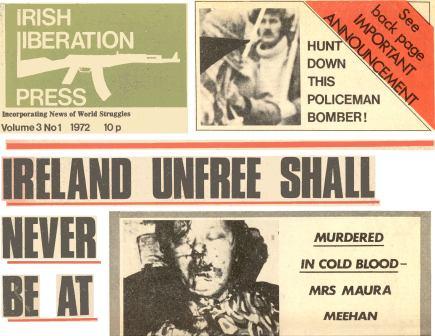
The Irish National Liberation Solidarity Front was a broad campaigning organization which produced the Irish Liberation Press, a paper for Irish workers in Britain, starting in March 1970. In 1972, the INLSF decided to shift its focus to organizing the working class at the point of production and the Communist Workers’ League of Britain (ML), which had previously been operating as the driving force within it, went public. In turn, the Irish Liberation Press was renamed the Voice of the People in March 1972; Davoren retired from active political involvement that autumn.
The Voice of the People was certainly the best produced UK ML paper in the 1970s: typeset and in colour with a professional layout. However, the organisation itself suffered from both a series of expulsions including the former General Secretary of the INSLF, and police scrutiny of its activities around the Irish struggle.
The principal legacy of the CWLB (ML) was two pamphlets: “Building Communist Revolutionary Bases at Place of Work” and “Hey It’s Up to Us!,” which inspired a short-lived “Marxist-Leninist Working Commission on Party Building Preparatory Work“ in 1977. The Commission maintained its focus on Marxist-Leninist unity, but efforts to bring groups together proved unsuccessful. It dissolved in 1981.
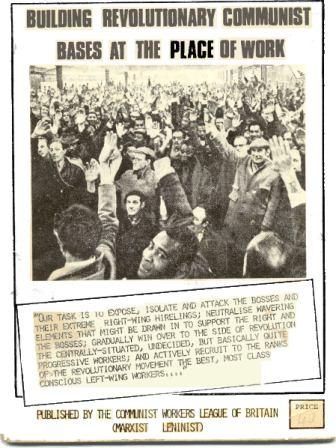
On the Social-Chauvinism of the R.C.L.B. by the Association of Communist Workers
Police Infiltrated the Irish National Liberation Solidarity Front by Donal O’Driscoll, Undercover Research Group
Special Branch and the Irish National Liberation Solidarity Front by Donal O’Driscoll, Undercover Research Group
1969 prosecution of Ed Davoren and others
Active Ideological Struggle Is The Key Link In Party Building by the Communist Federation of Britain (Marxist-Leninist)
Open Letter to the Communist Workers’ League of Britain (M-L) by the Marxist-Leninist Organization of Britain [from the pamphlet Ten Years On...From Revolution through Counter-Revolution]
People’s War versus Individual Terrorism
Editorial: Free These Patriots Now! Irish Liberation Press, Vol. 2, No. 1 (1971)
INLSF Intensifies Struggle Irish Liberation Press, Vol. 2, No. 1 (1971)
A Year of Progress for the INLSF
Counter-Revolutionaries Get Hammered
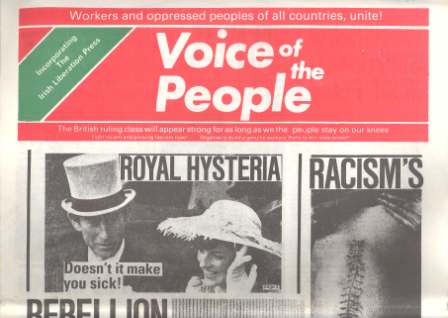
An Open Letter: ’A slave yourself, you assist in the enslavement of others’ Irish Liberation Press, Vol. 3, No. 1 (1972)
Ex-Soldier Exposes British Army Intelligence Spying Methods
A New Socialist Newspaper Will Go On Sale May 1, 1972 Irish Liberation Press, (1972)
Motive Behind the Race Riot That Wasn’t Voice of the People, Vol. 2, No. 4
Building Communist Revolutionary Bases at Place of Work
“Fascists and Racists Get Out of Our Town!” Voice of the People, Vol. 5, No. 1 (1975)
What This Paper Stands For Voice of the People, May 1977
The Labour-Tory-Liberal Anti-People’s Alliance Must Be Smashed–The VOP Policy for the Next General Election Voice of the People, May 1977
Front Page Change Voice of the People, May 1977
Why British Workers Must Support Ireland’s Struggle Voice of the People, 1980
Royal Romance and Oppression Go Hand in Hand Voice of the People, August 1981
[Back to top]
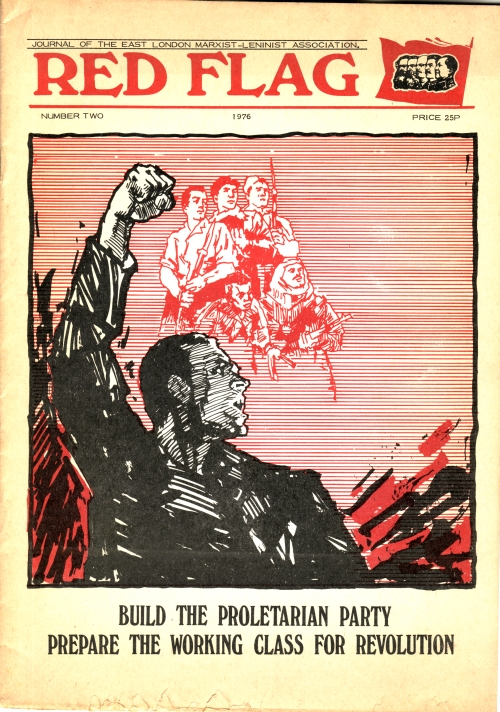
The ELMLA evolved out of a Marxist-Leninist-dominated broad front organization called the North London Alliance in Defence of Workers Rights (NLA), which was formed in April 1971. The NLA produced the Bulletin which was incorporated in a printed broadsheet newspaper, Class War, starting in the spring of 1972. It was involved in community oriented campaigning that resulted in police attacks on its street meetings in Wood Green and Turnpike Lane in North London.
A Marxist-Leninist core inside the North London Alliance, the Mao TseTung Study Group, was instrumental in concentrating its work on East London. Its members were involved with the Red Star Press that republished the ’Works’ of Stalin, and in initiating the Anti-Imperialist Coordinating Committee, which worked with students from the Third World in London in the early 1970s. Tension over the political direction and activities of the NLA raised criticisms that the Alliance was merely an expedient front for the Mao TseTung Study Group.
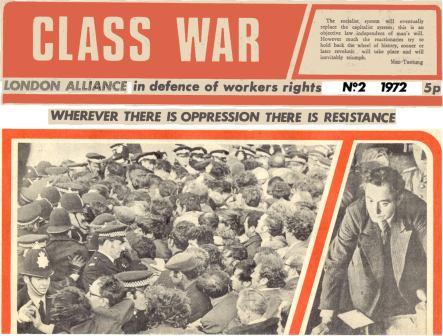
Members of the Mao TseTung Study Group subsequently formed the East-London Marxist-Leninist Association (ELMLA). The ELMLA established a factory cell at Ford Motor Company in Dagenham and produced the journal, Red Flag. The group split with the expulsion of two activists promoting the line “that the working class has been bought off with imperialist super profits.” After a turbulent six months of candidate membership in the CPB (ML) and the dissolution of the ELMLA in 1977, its leading members joined the RCLB.
Bulletin #1: Smash Creeping Fascism by the North London Alliance in Defense of Workers Rights [1971]
Class War #1 by the North London Alliance in Defense of Workers Rights [1972]
Class War #2 by the North London Alliance in Defense of Workers Rights [1972]
Reply to Comrade L. [Unpublished letter]
Editorial: Towards Marxist-Leninist Unity
Oppose Superpower War with Revolution
History Study Notes: Communist Principles in Two World Wars
[Back to top]
The Joint Action Committee of Marxist-Leninists (JAC) was formed in 1975 from a number of ad hoc groupings of non-aligned activists, almost exclusively intellectual in composition, including the Manchester Marxist-Leninist Group, which emerged from the university milieu in the 1970’s. The JAC chiefly worked in various solidarity campaigns (notably around Eriteria and Kampuchea) and undertook the translation of several European Marxist-Leninist texts. The JAC survived in the fractured environment of the UK Maoist movement because no other group could use its members’ unquestionable talents or, perhaps just as importantly, break down their unwillingness to submit to political direction within a party-building organisation.
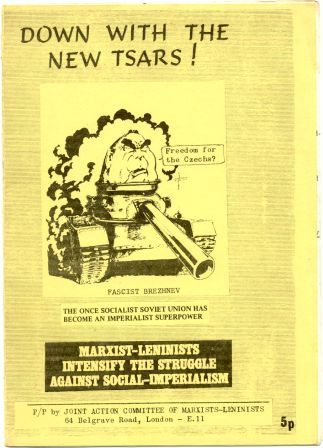
The mainly London-based JAC was involved in organising the July 1977 Conference at Birmingham initiated by the CWM, who had no London-based members at that time. With the failure evident at that conference the JAC had largely lost its purpose and it dissolved later that year.
Proposal for ’The Aims and Principles of the Joint Action Committee of Marxist-Leninists’
Statement to the JACML from the Manchester Marxist-Leninist Group
Down with the New Tsars! Marxist-Leninists Intensify the Struggle Against Social-Imperialism by the Joint Action Committee of Marxist-Leninists
[Back to top]
The Communist Organisation in the British Isles (COBI) was founded in 1974 by former members of the British and Irish Communist Organisation who disagreed with a range of that group’s policies and analysis.
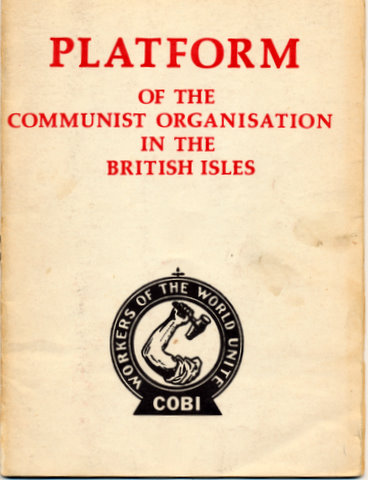 COBI was an unorthodox anti-revisionist organization, drawing inspiration from the old De Leonist Socialist Labor Party as well as Mao zedong.
COBI published four issues of a journal called Proletarian, as well as a number of pamphlets and flyers.
In 1977, the group changed its name to Communist Formation and produced one issue of a journal by the same name. It disbanded several years later.
COBI was an unorthodox anti-revisionist organization, drawing inspiration from the old De Leonist Socialist Labor Party as well as Mao zedong.
COBI published four issues of a journal called Proletarian, as well as a number of pamphlets and flyers.
In 1977, the group changed its name to Communist Formation and produced one issue of a journal by the same name. It disbanded several years later.
What is the Communist Organisation in the British Isles?
Platform of the Communist Organisation in the British Isles
Communism, the Labour Party and the Left
The Crisis of British Capital, Part 1: Causes
The Crisis of British Capital, Part 2: Consequences
COBI: Statement on Parliamentarism
The CPGB, IS and IMG at the ’74 General Elections
Comments on the Transitional Programme
Why Communist Organization In the British Isles Says Vote For the EEC
How COBI Proceeds – Three Letters on C.O.B.I.’s Perspectives
Platform of the Portuguese Revolutionary Councils
Scientific Socialism. Its Revolutionary Aims and Methods by William Paul
The Distinguishing Features of Leninist Political Practice
Socialist Unity – A Critique of Their Programme
[Back to top]
This was a small group lead by Alex Hart, an early anti-revisionist and doctor by occupation who had been a founder of the Working Peoples Party of England, but then became an early convert to the ’green socialism’ that came out of the German Democratic Republic.
On the Soviet Revolution under Lenin. A review of “Les Luttes de Classes en URSS 1917-1923” by Charles Bettelheim by Alex Hart
working people, No. 7, May-June 1975
working people, No. 9, September-October 1975
[Back to top]